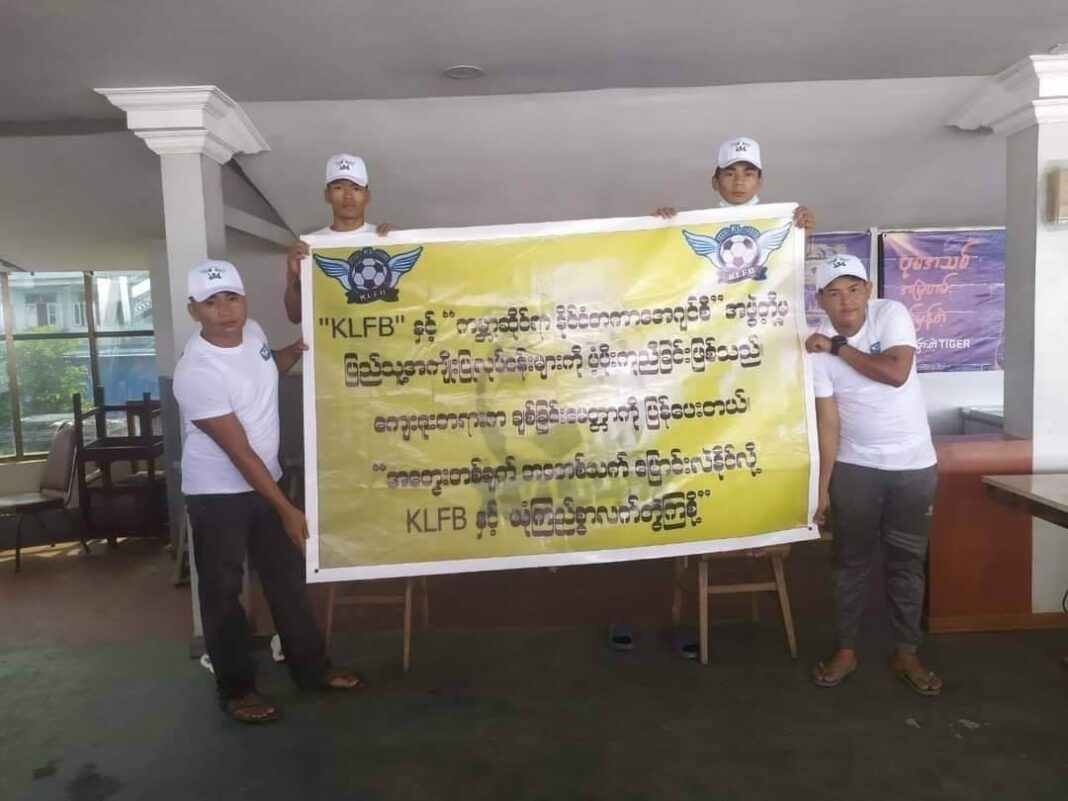After the military coup, inflation has surged, posing challenges for individuals in securing employment. As a result, many are turning to easily lucrative jobs.
Notably, the influence of online game advertisements on platforms like Facebook and Telegram has become significant among these options.
Nineteen-year-old Sai Khur from Hsipaw is one of those influenced by online games.
He began engaging in an online gambling game called KLFB after encountering an internet advertisement and being persuaded by friends to give it a try.
Reflecting on his experience, he shared, “I wasn’t aware of it initially. I started playing last August, because a friend invited me to try it out. At first, I wasn’t very interested, but after a few persuasions, I finally gave it a shot, and I’ve been playing since then.”

The KLFB online game started gaining popularity in March 2023. To participate, players must join a Telegram group facilitated by a team leader. Subsequently, members follow a provided link to engage in football gambling and play the game.
Sai Khur explained, “Once you’re in the game, you place bets on the specified football matches. If you deposit money for the bet, they reimburse you with additional interest or profit. For example, if you wager 500,000, they’ll return it to you with extra money based on a percentage.”
Because of the incentive of the possibility to get 5% to 8% profit, not only manual workers but even people who have regular income jobs would get interested.
Sai Khur, a construction worker earning six to ten thousand kyats (2-4 USD) per day, invested all his earnings in the KLFB game, influenced by friends’ encouragement.
Initially, they could carry out financial transactions, including withdrawals and deposits, through Kpay (a mobile payment system). However, after two months, they discovered that such money transactions were no longer feasible.
“Now, we are unable to withdraw any money, and there’s talk that it was a scam originating from Laukai town. Rumors suggest the scammer has already escaped to the Thai border region. We have no idea about the number of people involved or how many teams exist. I’ve heard that numerous individuals in Hsipaw engaged in this game, resulting in many losing their money,” Sai Khur shared with S.H.A.N.
Since October 13, individuals have faced challenges withdrawing money from their KLFB online game accounts. On October 19, an announcement was made stating that they could retrieve their funds after depositing 5% of their existing money within 48 hours. However, even after complying with this requirement, players reported that they were still unable to withdraw their money.
“On October 21st, we heard that the website was going to shut down. Some friends still log in to play, but most of them end up losing their money. There are those who just started to join for about 5 or 6 days and also lost their money. Some have even lost hundreds of thousands. It doesn’t matter if they keep playing or not; they won’t be able to recover their money,” shared a young player from Lashio with S.H.A.N.
Again on October 22nd, the KLFB’s Telegram channel issued a final notice, urging players who hadn’t made payments to swiftly deposit 5% within 18 hours.

Despite the KLFB application utilizing the financial transaction services of banks, such as Kpay and KBZ Special Account, for the online scam orchestrated by certain groups, Kanbawza Bank has distanced itself, disclaiming any responsibility and only cautioning people about these fraudulent activities.
In this instance, individuals who were also victims estimate that around 500,000 KLFB game players were defrauded of billions of Kyats.
Despite claims that the KLFB application operates under the Kaidali football club platform, headquartered in England, none of the players are aware of the actual individuals behind the application and its activities. However, based on rumors circulating among KLFB football players, there is speculation that it originated from Laukkai, Shan State.
In the current situation of political instability due to the military coup and a lack of a rule of law, individuals like Sai Khur from remote communities find themselves without avenues for complaint or assistance when manipulated and scammed by opportunistic individuals.
Those who participate in promoting such games on social media, accepting payment for advertisements, also bear a level of responsibility. Unfortunately, cases like these have been overlooked by the core supporters of the military and the police under the SAC regime.
Sai Khur, like many others, invested his entire two months’ salary into the game, only to lose it. Now, he grapples with family issues and faces social challenges as a consequence.
“My friends assured me of profits and urged me to play. Focused only on the potential gains, I invested all the money I earned from my hard labor, which amounted to only 8000-10000 MMK (2-4 USD) a day. Unfortunately, I ended up investing hundreds of thousands and got nothing in return, not even the initial investment,” lamented Sai Khur.
Individuals who have played these online games and fallen victim to fraud caution other young people to steer clear of similar traps. They emphasize the importance of not trusting scams that are becoming more common on various online social media platforms, particularly in the aftermath of the coup.
“I want to stress to my friends that online games and online businesses are not reliable and should not be trusted easily. Many of them end up being scams. Based on my firsthand experience, I don’t want other young people to play this game like me and face similar challenges. There’s no certainty about when their accounts will be shut down; there’s no guarantee. Your account could be easily closed down,” emphasized Sai Khur.

















Leave a Comments